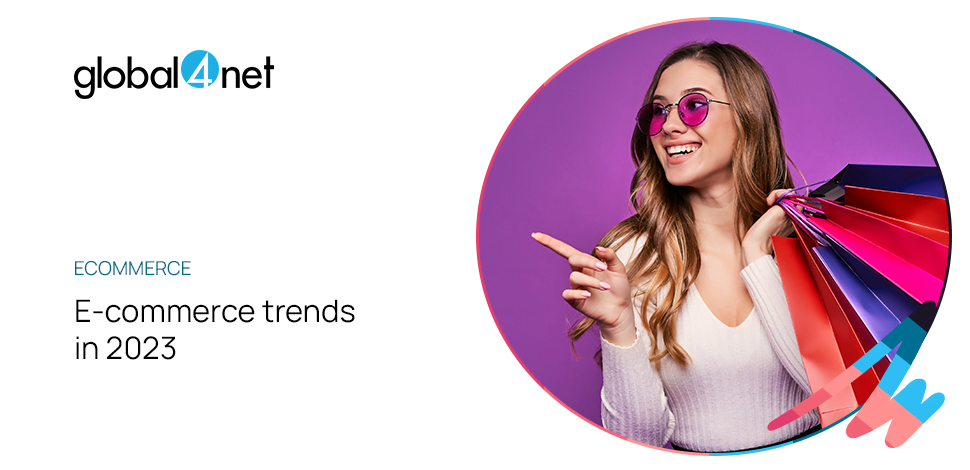E-commerce trends in 2023

E-commerce is still rapidly developing, even despite the unstable global situation. Predictions are retail e-commerce sales worldwide will surpass $6.3bn this year. Every year, there are new trends and technologies that shape online trade. What can we expect this year?
We’ve made a list of 10 predictions that will help you plan the development and marketing campaigns in your company. Let’s have a look at them.
Personalization
Granted, this trend has been around for some time, but its significance is only growing. People expect personalized experiences, and that includes:
- Product recommendations
- Communication with customer service
- Special offers and incentives
- Store’s knowledge about past interactions
According to a new study published by Elastic, over 80% of online shoppers say personalization influences their purchases:

Source: https://venturebeat.com/data-infrastructure/report-84-of-online-shoppers-say-personalization-influences-their-purchases/
AI and chatbots
Artificial intelligence helps online store owners streamline repetitive actions and make their efforts more accurate. Chatbots are a good example. With them, online stores can automate up to 70% of customer conversations! Chatbots can answer frequent questions, recommend products and services, and even help track order status. Plus, they give you access to 24/7 customer service.
AR and VR
Augmented and virtual reality comes in handy when it comes to discovering products that you cannot see live. Thanks to these two technologies, customers can use their phones or VR goggles to see products offered by online stores in a completely new way. Here, IKEA is a good example. Their mobile app helps customers pick the right furniture and even check if it will fit without the need to go to the store.
Mobile payments
They have been on the rise for some time now, primarily because they are very convenient and quick. In Poland, we have a mobile payment solution called BLIK. It’s valued for the speed and safety of every transaction. In May last year, BLIK representatives confirmed that this platform became a member of the SWIFT system, thus enabling expansion abroad. Surely, we can expect more mobile payment solutions in 2023.
Social media marketing
Here, we talk especially about Instagram – this platform offers tremendous marketing potential. According to Hootsuite, 50% of people use it to discover new brands and products. And 2 in 3 people say the network helps foster meaningful interactions with brands. Is social media marketing a part of your 2023 marketing strategy? It should be!
Increase of the blockchain’s role in e-commerce
Blockchain is a safe and versatile technology that has gained supporters and users in almost every sector. E-commerce is no exception. In this sector, blockchain can be used to:
- Improve the security of customers’ data
- Streamline shipping (e.g., through real-time parcel tracking)
- Streamline access to receipts and warranties
- Eliminate intermediaries (e.g., payment gates)
Quick and non-standard deliveries
Online stores know that products should reach their destinations as quickly as possible. That’s why express delivery (under 48 and even 24h) will be one of the major e-commerce trends this year. Additionally, customers are likely to be interested in non-standard delivery options. Here’ HelloDone is a good example. It’s a British conversational AI platform that enables users to ask for non-standard delivery. For example, the user can write in the system to “leave the parcel in the backyard in the grey bin”.
Geolocation
This trend plays a big role in the omnichannel model. With geolocation data, your company can “see” where your customers are located. You can use this knowledge to, e.g., invite them to visit a nearby store or to automatically adjust your website to a given customer based on their location. For instance, a customer in Germany can see different products and their availability compared to a customer in Spain.
Ethical and sustainable e-commerce
Today, more and more customers want to buy products in an ethical way. We care about the environment, and the way products are made. If you want to grow your business, it is worth showing that you are ethical about your business and that you care about our planet.
In the recent Deloitte study, we can read: “Gen Z no longer forms opinions of a company solely based on the quality of their products/services but also now on their ethics, practices and social impact.”¹ And according to a different study cited by Forbes, “nearly 90% of Gen X consumers said that they would be willing to spend an extra 10% or more for sustainable products, compared to just over 34% two years ago.”² Today, this shift is clearly visible.
Voice commerce
Again, it’s all about convenience. This technology uses AI and NLP to interpret the customer’s purchase intent. For instance, if a customer says, “I want to buy a new laptop,” the voice assistant will be able to understand what they want to buy and immediately take them to a specific product page. In the more advanced version, the assistant will be able to place an order on the customer’s behalf.
¹https://www2.deloitte.com/us/en/pages/consumer-business/articles/understanding-generation-z-in-the-workplace.html
²https://www.forbes.com/sites/gregpetro/2022/03/11/consumers-demand-sustainable-products-and-shopping-formats/?sh=2de211c76a06








